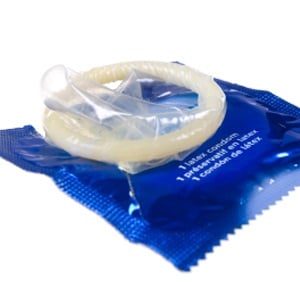
Sexual intercourse with an HIV-infected person
Transmission of HIV is primarily through unprotected vaginal or anal intercourse (i.e. sexual intercourse without a condom), as well as through oral sex under certain conditions.
How does HIV get into the body during sexual contact?
To gain entry into the body of an uninfected person, the HI virus needs to bind or “latch onto” target cells with specific receptors (namely CD4 receptors) on its surface. Cells with these special receptors are plentiful in the lining of the genital track and that of the anus.
During unprotected sex with an HIV+ person, the virus (in the sexual fluids of the infected person) binds with the CD4 receptors in the lining of the genital tracks (e.g. vagina) or anal track of the uninfected partner.
Tears (often microscopically small) in the membrane linings of the genital tracks - especially in the anal-rectal area - also make it easy for the virus to enter the sex partner’s bloodstream. Because the membrane linings of body cavities - especially in the anal-rectal area, and, to a lesser extent, in the vagina - are very delicate, they can be torn as a result of friction generated during sexual intercourse. (Rough sex, dry sex and forced sex or rape often lead to friction, tears and bleeding.)
Sexually transmitted infections (STIs), such as syphilis, gonorrhoea or herpes, make it very easy for HIV to get into the body. An untreated STI in either partner increases the risk of HIV transmission during unprotected intercourse ten-fold.
People with genital herpes or genital ulcers or sores are especially susceptible to HIV infection because these conditions create openings in the linings of the genital tracks through which HIV can move. The discharges produced by many STIs contain a very high concentration of HIV if that person is also HIV positive.
Read: Herpes treatment has no effect on HIV
Why are women more easily infected by HIV than men?
Women are two to four times more likely to get infected with HIV through unprotected vaginal sex than men, due to the following reasons:
- Women, as the recipients of semen, are exposed to semen for a longer time (while semen remains in the body of a woman for a few hours, a man is exposed to the body fluids of a woman for only a short time);
- The concentration of HIV in semen is much higher than the concentration of HIV in vaginal fluids;
- Women possess a larger surface area of mucosa (the thin lining of the vagina and cervix) which is exposed to their partner’s secretions during sexual intercourse;
- Many women have cervical or vaginal conditions, such as STIs, erosions, open sores and infections, that facilitate the transmission of HIV;
- Many women practise “dry” sex and they cause damage or infection to the vaginal walls (“dry” sex is a cultural practice where women use herbs or other substances - such as Jik or washing powder - to dry out their vaginas for the benefit of some men who believe that a dry vagina is a sign of faithfulness, or to heighten their sexual pleasure.) This practice is painful and extremely dangerous because it increases the risk of HIV infection;
- Transmission of HIV is more likely to occur just before, during or immediately after menstruation because of the large, raw area of the inner uterine lining that is exposed;
- Younger women are especially vulnerable to HIV infection because their genital tracts are not yet fully mature, their vaginal secretions are not so copious, and because they are more prone to lacerations or tears of the vaginal lining. (There is also evidence to suggest that women once again become more vulnerable to HIV infection after menopause).
- Women often practice anal sex to avoid pregnancy, to maintain “virginity”, or because their male partners prefer anal sex for reasons similar to the reasons why they prefer “dry sex”. Research has shown that the chances to become infected with HIV after one act of unprotected receptive anal sex is approximately 20 times greater than after one act of unprotected vaginal sex.
- Social inequalities often make women more vulnerable to HIV infection especially in societies which accord women a lower status than men. Women in such situations have little or no control over their sex lives, and they are not in a position to negotiate safer sex practices because they fear violence and abandonment should they try to do so. Women from low socio-economic environments are often driven to prostitution, and they are particularly vulnerable to rape.
Read: Women's vulnerability to HIV
Can lesbians get Aids?
Yes, lesbian women can also get Aids.
Lesbians who have sex with women as well as men, can contract HIV infection if they have sex with infected men.
Although the risk of HIV-infection is small for women who have sex exclusively with other women, lesbian women can contract HIV infection by sharing contaminated sex toys (e.g. vibrators or dildo’s) for vaginal or anal penetration. Because sex toys can cause bleeding or irritation of the vaginal or anal lining, it is easier for the HI virus to enter the body if people use them or share them. When sex toys are used, they should be thoroughly cleaned and preferably not shared, but if they are shared, the sex toy should be covered with a condom (a new condom for each partner!).
It should also be kept in mind that menstruation blood of an HIV+ woman is contagious. A plastic/latex cover such as “glad wrap”, a dental dam, or a condom that is cut open, should be placed over the vagina for oral sex (also for heterosexual oral sex with a woman).
Can one be infected with HIV through having oral sex?
Oral sex (stimulation of the penis with the mouth, or stimulation of female genitals with the lips and tongue) may cause a person to become infected with HIV if the lining of the partner’s mouth is exposed to infected seminal fluid or vaginal and rectal mucus - especially if the person providing the oral stimulation has sores, bleeding gums or inflammation in his or her mouth. Keep in mind that the virus occurs in high concentrations in semen and in menstrual blood.
A condom should always be used for oral sex on a man (also called fellatio), and a plastic/latex cover such as “glad wrap”, a dental dam, or a condom that is cut open, for oral sex on a women (also called cunnilingus).
Read: Tips for safe oral sex
How many sexual contacts with an HIV-positive person are necessary before one becomes infected oneself?
It is impossible to say how many sexual contacts with an infected partner/s are necessary before an HIV-negative person becomes HIV-positive.
HIV transmission from one person to another through sexual contact can depend on any of the following factors:
- Unprotected (without a condom) sex with multiple sex partners.
- The presence of other STIs (sexually transmitted infections), especially in the case of genital ulcers and inflammatory STIs.
- Trauma (or bleeding) during sex, as well as menstruation.
- The viral concentration (or level of viral “load”) in the blood of the infected partner.
- The level of viral load in the semen or vaginal fluids of the infected partner (Viral load in semen peaks three weeks after infection. HIV is 20 times more transmissible per sex act, at this stage.)
- The phase of infection. HIV is much more contagious in the acute infection phase (first eight to 12 weeks after infection) as well as in the final phases when advanced disease (or Aids) has set in. The reason why HIV is easier transmitted during these phases, is because the viral load is especially high in the acute infection phase, and again in the final phase of Aids.
- When the immune system is suppressed (this is also then an indication of a high viral load and a low CD4 count.
- Other diseases such as malaria. The HIV viral load is very high in people who also have malaria.
- HIV-1 subtype C is more infectious than other subtypes, and subtype C is unfortunately the viral subtype that occurs in South Africa.
Is it true that circumcision can protect males against HIV infection?
Several studies reported at the Aids conference in Barcelona (2002) indicated that circumcision can indeed reduce the risk of HIV infection for the circumcised male, but:
- It seems that circumcision only provides a measure of protection if the circumcision was done before the boy reached puberty (cancel those appointments men!)
- The direction of effectivity is not clear yet (in other words, will male circumcision also lower the risk of male to female transmission - and protect the sex partner?)
- If the circumcision procedure is done with unsterilised, dirty blades (or other instruments) - as often happens in Africa - HIV-infected blood could pass from one boy (or male) to another.
- Although circumcision may lower the risk of HIV infection in circumcised men, circumcision should definitely not be promoted as the only way of preventing HIV infection! Safer sex practices such as the use of condoms should always be practised, disregarding circumcision or not!
Read: How circumcision reduces HIV risk
If I am HIV+, why should I still use a condom to protect myself?
HIV+ individuals still need to protect themselves against re-infections with HIV, for the following reasons:
- Each new infection can cause an increase in the viral load in the blood and
- The person can become infected with a new strain of the virus. It is therefore important for HIV+ people to protect themselves from re-infection by always using condoms.
Read more:
Risk factors for HIV infection
Symptoms and phases of HIV infection
When Aids sets in




 Publications
Publications
 Partners
Partners















